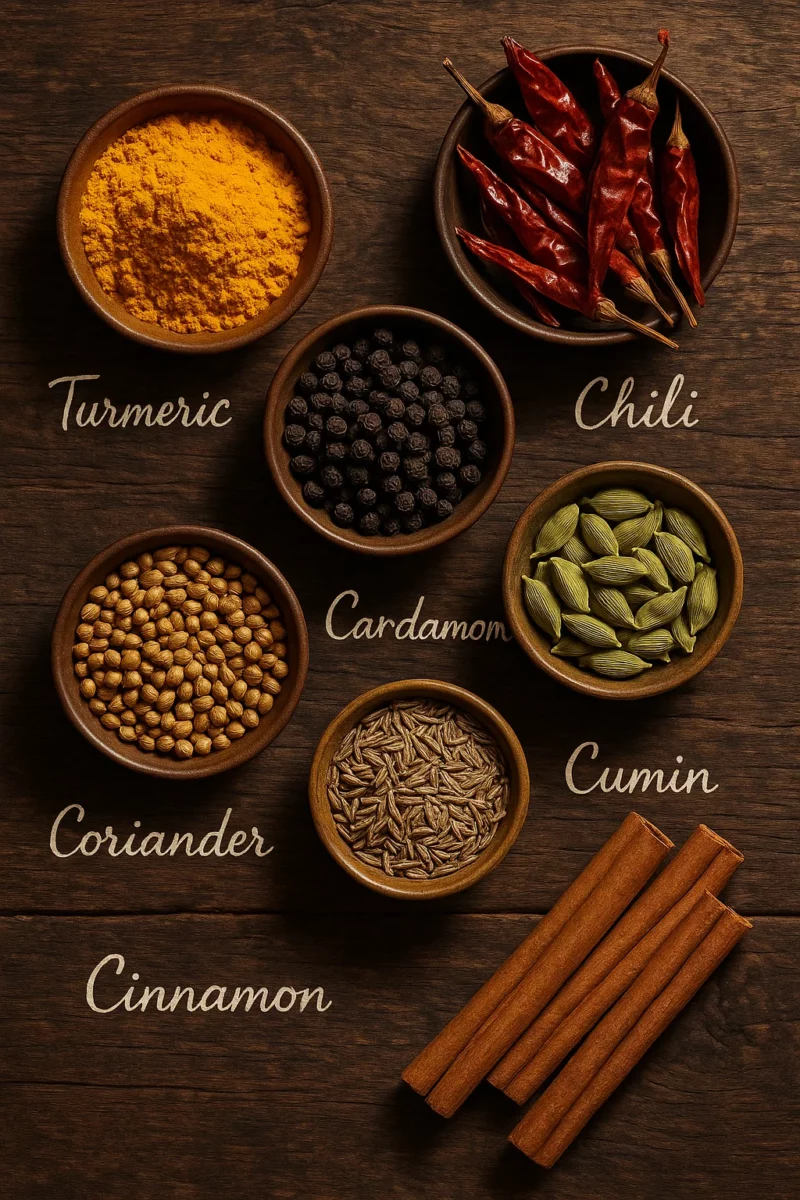Imagine this: a farmer in Kerala grows organic turmeric, you package it properly, get the right certificates, ship it safely, and soon a French family is using that turmeric in their dinner. That’s the opportunity waiting for Indian exporters today.
Shipping organic spices to France is one of the most profitable opportunities for Indian exporters today. The French market, along with the broader European Union (EU), is rapidly increasing its demand for natural and organic ingredients. From turmeric and black pepper to cardamom, cumin, and chilli, Indian spices are staples in French kitchens, restaurants, and the food processing industry. People in France love experimenting with flavours, and organic products are becoming more popular every single year.
But success in this market depends on much more than just having high-quality products. Exporters must carefully navigate spice export tariffs in France, customs duties on Indian spices in France, and the complex customs clearance process for French spices. In simple terms, that means knowing how much tax you’ll need to pay, what paperwork is required, and how to make sure your shipment clears the border without problems.
On top of that, exporters also have to follow strict France customs regulations for spices, obtain EU organic certification for spices, and comply with European Union import compliance spices rules. Think of these as the rules of the game; if you don’t play by them, you won’t be allowed on the field.
This guide explains everything you need to know in a way that’s easy to follow: duties, taxes, logistics, labelling, certification, and trade agreements.

1. Spice Export Tariffs to France
The EU applies a uniform tariff system on imports, and spices from India are no exception. Spice export tariffs in France vary by HS code:
- Black pepper has a different tariff rate than turmeric or cumin.
- Chilli powder and turmeric powder may attract separate duties.
- Blended spice mixes usually face higher tariffs compared to raw, unprocessed spices.
For Indian spice exporters in France, these tariffs directly impact profit margins. Staying updated with the EU tariff schedule is critical. In some cases, trade agreements with India and France spices allow exporters to benefit from reduced tariffs or even duty-free spices under EU trade policy.
2. Customs Duties on Indian Spices in France
Once your shipment arrives, it will be assessed for customs duties on Indian spices in France. These duties are calculated on the CIF (Cost, Insurance, and Freight) value of the goods.
Important points to note:
- Duties are charged in addition to organic spice import taxes EU, such as VAT.
- Some consignments qualify for preferential duty treatment under trade agreements India-France spices.
- Incorrect HS code classification can cause penalties, delays, and even shipment rejection.
A trusted customs broker can simplify the customs clearance process for French spices and help you avoid errors.
3. Organic Spice Import Taxes in the EU
Besides duties, all shipments face organic spice import taxes EU, which mainly take the form of Value Added Tax (VAT).
In France, the standard import VAT France spices rate is 20%, applied on the customs value plus duties.
Example: A shipment valued at €10,000 with €500 in duties would attract €2,100 VAT, totalling €2,600.
Although VAT is usually borne by the importer, exporters should be transparent to maintain trust.
4. EU Organic Certification for Spices
To sell as “organic,” you must obtain EU organic certification for spices. Without it, products cannot legally be marketed as organic in France.
Certification ensures that:
- No chemical pesticides, fertilisers, or GMOs are used.
- A transparent supply chain is traceable from farm to packaging.
- Independent certification bodies confirm compliance.
For Indian spice exporters to France, certification not only boosts credibility but also fulfils the European Union import compliance spices standards.
5. France Customs Regulations for Spices
France customs regulations for spices are strict because spices fall under food and agricultural products. Exporters must comply with:
- Food hygiene and safety standards.
- Secure packaging to avoid contamination.
- Meeting container requirements for spices export, including fumigation and moisture control.
Failure to comply can result in rejection, destruction, or re-export of goods, costing both money and reputation.

6. Labelling and Traceability in Spice Exports
Labelling requirements for organic spices are crucial in the EU. Export labels must include:
- Product name and HS code.
- Country of origin (India).
- EU organic certification logo.
- Batch number and best-before date.
- Importer’s details in France.
Alongside labelling, traceability in spice exports is mandatory. Exporters must document the full journey of the spice, from the farmer to the shipment, to satisfy French regulators.
7. European Union Import Compliance for Spices
To meet European Union import compliance spice standards, exporters must provide:
- Certificate of Origin.
- Invoice and packing list.
- Organic certification paperwork.
- Phytosanitary certificate.
- Transport and insurance documents.
If even minor mismatches occur in documents, the customs clearance process France spices can be delayed, increasing costs.
8. Logistics and International Shipping Costs
Efficient logistics are vital when shipping organic spices to France. Exporters must weigh cost against delivery timelines.
- Air Freight: 7–10 days, suitable for small high-value shipments but expensive.
- Sea Freight: 25–35 days, cost-effective for bulk shipments.
Common routes include Indian ports (Mumbai, Chennai) shipping to Marseille, Le Havre, or via Rotterdam before entering France.
Expenses include:
- International shipping costs from India to France.
- Insurance and warehousing.
- Port handling charges.
- Freight charges organic spices export.
Planning spice export logistics from India to Europe ensures smooth delivery and helps exporters remain competitive.
9. Customs Clearance in France
The customs clearance process in France spices involves:
- Submitting documents to French customs.
- Paying customs duties on Indian spices in France and import VAT France spices.
- Undergoing inspections for organic certification and quality.
- Release of goods to the importer.
Many exporters rely on freight forwarders to handle this, avoiding costly mistakes.
10. Trade Agreements and Duty-Free Opportunities
France follows the EU trade framework. Exporters should explore trade agreements for India and France spices, which can significantly reduce tariffs.
Options include:
- The EU’s Generalised Scheme of Preferences (GSP), which reduces tariffs on select goods.
- Special provisions for duty-free spices under EU trade policy.
Understanding these agreements can give exporters a competitive edge in pricing.
11. GST Refund for Indian Exporters
While duties and taxes apply in France, Indian exporters benefit from the GST refund for spice exporters in India. Since exports are treated as zero-rated under GST, exporters can reclaim input taxes paid on raw spices, packaging, and transportation.
This refund improves cash flow and supports reinvestment into business growth.
12. Best Practices for Indian Spice Exporters
To succeed in the French market, exporters should:
- Stay updated on spice export tariffs in France and tax changes.
- Comply with France customs regulations for spices.
- Meet container requirements for spices export to avoid cargo rejection.
- Adopt digital systems for traceability in spice exports.
- Work with experienced logistics providers for spice export logistics from India to Europe.
- Explore opportunities for duty-free spices under the EU trade policy.
Conclusion
In the end, shipping organic spices to France is more than just an export opportunity,it’s a gateway for Indian exporters to establish themselves in one of the most lucrative organic food markets in Europe. France, with its growing consumer preference for clean, natural, and traceable food products, offers a market that values exactly what Indian spices bring to the table: authenticity, quality, and tradition.
Of course, entering this market does require careful planning. Exporters must be prepared to handle customs duties on Indian spices in France, obtain and maintain EU organic certification for spices, manage international shipping costs from India to France, and ensure compliance with European Union import standards for spices. Each of these steps may seem complex at first, but they are essential for building trust and credibility with French buyers and regulators.
By investing in proper packaging, meeting labelling requirements for organic spices, maintaining traceability in spice exports, and staying updated with France customs regulations for spices, exporters can eliminate the risks of rejection or delays. Add to that the benefits of trade agreements India-France spices, and even the possibility of accessing duty-free spices under the EU trade policy, and the French market quickly becomes a high-potential growth destination.
For exporters already in the spice trade, this is the right time to expand into the organic sector. And for those just starting, France presents one of the most welcoming markets in Europe. With strategy, compliance, and the right logistics partners, shipping organic spices to France can become not just a business decision but a long-term growth engine.
The opportunity is clear, the demand is strong, and the systems are in place; what’s left is for Indian exporters to take the next step and claim their space in France’s booming organic spice market.
Frequently Asked Questions
You’ll need a Certificate of Origin, EU organic certification for spices, an invoice and packing list, a phytosanitary certificate, and all transport-related papers. These documents are checked during the customs clearance process for French spices.
Yes. Customs duties on Indian spices in France are applied based on HS codes and the customs value of the shipment. On top of that, importers usually pay import VAT France spices, which is generally 20%.
Without EU organic certification for spices, you cannot legally sell your products as “organic” in France or anywhere in the EU. This certification proves that your spices are grown without chemicals, are fully traceable, and meet all European Union import compliance spices standards.
Exporters can choose between air freight (faster but more expensive) and sea freight (slower but cost-effective for bulk). The best shipping routes India to France usually run from ports like Mumbai or Chennai to Marseille or Le Havre. Planning for international shipping costs India to France and freight charges organic spices export is essential to keep profits intact.
Yes. Under trade agreements India France spices and the EU’s duty-free spices under EU trade policy, certain spices may qualify for reduced or even zero tariffs. This makes Indian exporters more competitive in the French market.








